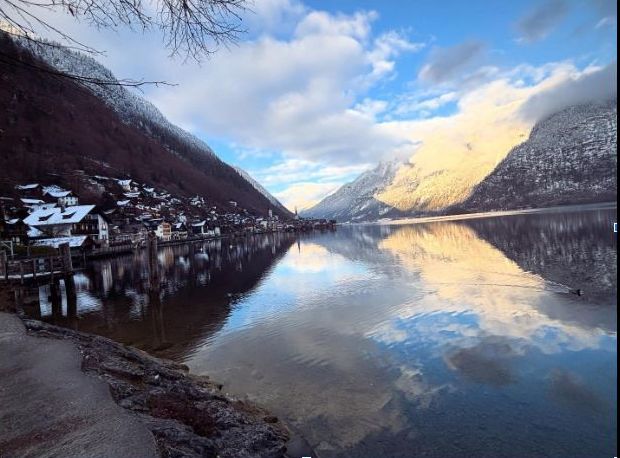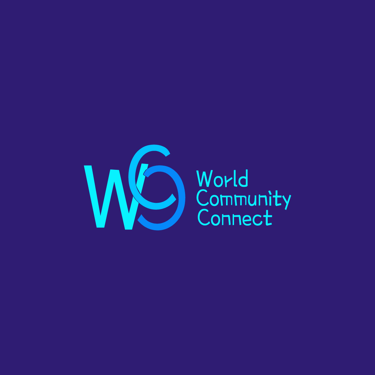Who gets to speak? Who gets to be seen? Self-representation vs external gaze
Visibility & Voice
Personal Images: Personal Semiotics of War
By Maša H.
The final months of my mother’s life are captured in this film. What you see here are only fragments of a longer piece—moments held in time, filled with both connection and sorrow. It was the first time I spoke openly with my entire family—my mother, my father, and my sister—about their personal experiences, and our shared history of war.
Soon after those conversations, my mother’s health declined rapidly, and she passed away a few months later. This film, finalized during my pregnancy, became an emotionally layered journey—one of reckoning with inherited wounds, saying goodbye, and carrying both life and loss within me at the same time.
Later, I returned to the diaries I kept during the war in Bosnia. They now form an essential part of this ongoing work—offering insight into a younger version of myself trying to make sense of chaos. This film is a bridge between generations, between memory and presence, and between the pain we carry and the stories we must continue to tell.
Fragments of Migration
By Maša H.
Migration stripped me of my identities. In a new country, I was no one—no recognized diploma, no familiar networks, no community to witness or celebrate who I had been. I had to leave behind old titles, past roles, and a sense of self that once felt solid.
Starting over meant learning a new language, adapting to new systems, and constantly proving my worth in spaces where I felt unseen..
Yet in that process, I also began to rebuild—slowly, and on new terms. Migration forced me to let go, but it also taught me resilience, humility, and the quiet strength of becoming.
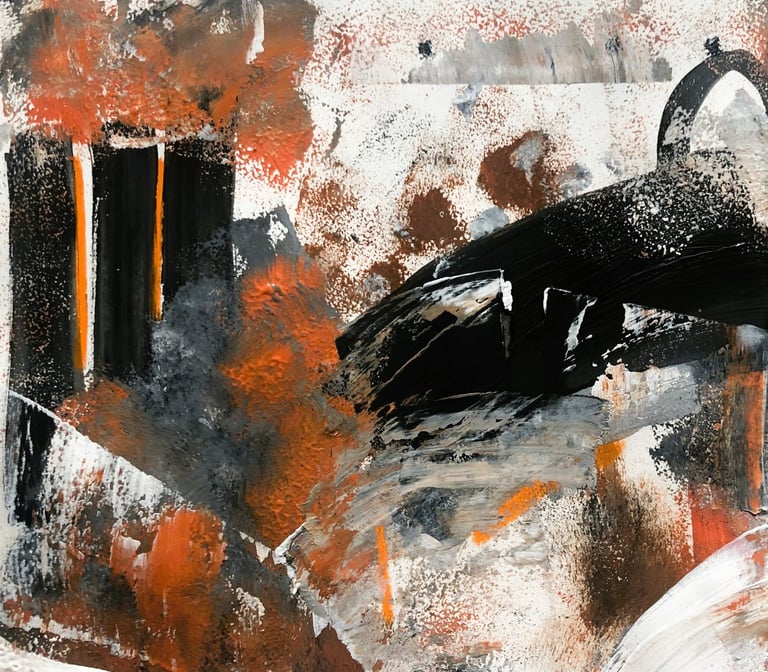

Not One of Us
By Maša H.
For many years, I struggled to accept my own identity or even define it clearly. Growing up in a poor, post-war country, I resisted the label of “victim,” yet often felt that was how I was seen—from outside the EU, from a place marked by conflict, with a family scattered across different countries and friends who, like me, never stayed where we were born. I carried a deep sense of dislocation.
As I moved into more structured and stable environments, I began to feel like an outsider. I witnessed families that had stayed intact, friendships that remained rooted in one place, and I struggled with a persistent sense of being an imposter. Belonging felt distant—something complex and difficult to grasp.
It wasn’t until I turned inward and began to explore these feelings…By confronting the fractures in my past, I began to reclaim my narrative, piece by piece.
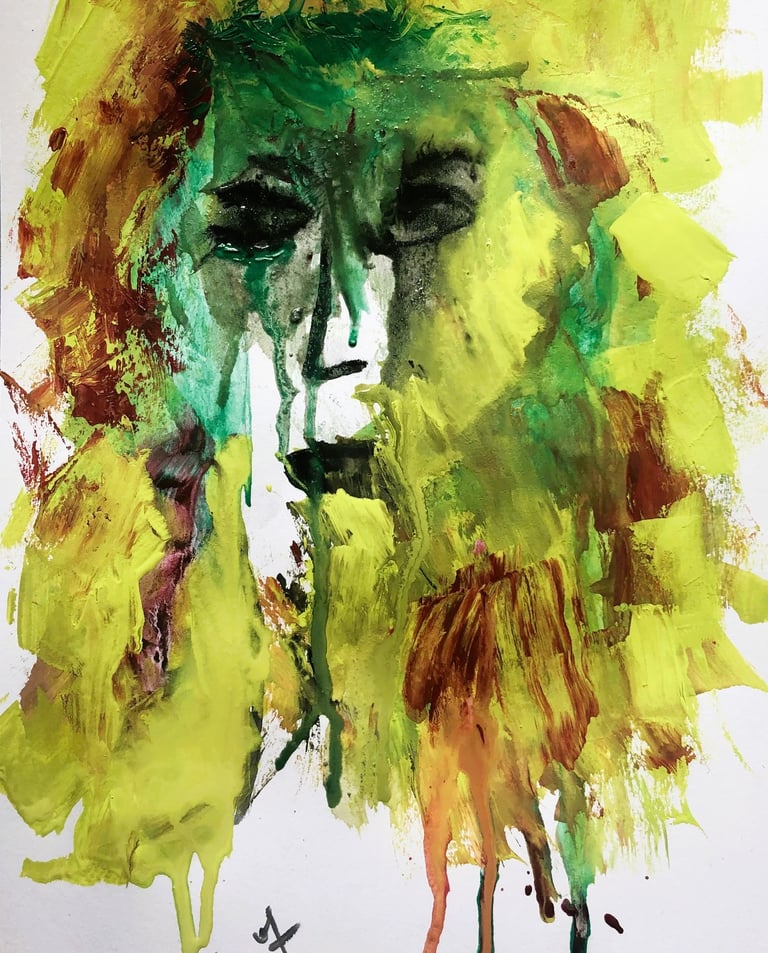

Shadow
By Eslem, 25
Oh, dear little ants, I wish I could be one of you, for the weight is too much to bear. Shadows...
They seem weightless, yet these shadows-they carry a burden. Do you want to see mine? Let me show you.
My shadow is here, its form is fear, fear of losing someone, something, or everything.
Soon the line of shadow will touch us, and one day, I'll stand on that line.
But you know - it no longer hurts, for it feels good to go where one truly belongs.
Demon
By Ana, 27
I ceated this piece after being creatively stuck for several months. All the drawings and paintings I'd created during that time felt "soulless". This demon nearly "burst" out of me and it's been getting better ever since. I am once again able to create things I am proud of.


To John
By Veronika, 47
....sucks... (so many things went kindasortof wrong) half wrong... stressful and unproductive...
there r moments when i see clearly what i should do and the next moment it all crumbles up...
I do not know how to read all the signals that life is sending me?!
I feel like I am losing ground and falling and falling and getting back on feet only to fall again....
I wish i had blind faith in you...I wish I had blind endless spotless deep love for you...I wish you had the same...I wish I knew where we should live... I wish I could say "Birmingham" would be lovely in spite of the fact I have never even been there....
I wish you were here to hug and help and provide support...I wish I did not feel so lonely right now...I wish I had the strengh to start writing an article that´s due at 11pm.
I wish I could do yoga more than 3 weeks ago last...
I wish I could just lay down one day and procrastinate.
I wish I could give our girls more than I can...I wish I you were here... in your "Honzik" mood... if only you were more patient and had a heart flooding with emotion for me...
I wish I had more self-confidence and sharp intelligence... and just KNEW...
I don´t know what to do first and next... and I think I am tired
By Michaela B.
The pen glides over the paper… How the hell do you come up with this?
I don’t make it up, it paints itself. How does it paint itself?
Well, I don’t even take off my glasses, I don’t want to see it exactly. I let the pen glide over the paper.
But do you see what you’re painting? They’re just fragments - here it’s probably a tree, - here’s a long wavy line that goes down…
But what’s appreciated is what’s thought out in advance, what’s logical…
WHY?
How why? That’s right. That’s appreciated. The effort put in to communicate something important, the work done
I THINK IT’S APPRECIATED, MAYBE it sells better
Yours are just scribbles without any order or structure
I DON’T think they’re without order
On the contrary, there is an order there, I feel it when that hand fills the paper
Do you paint with feeling? Yes, something like that
I must feel that it's not falling, that it's balancing on the contrary
So what actually are you doing?
I guess I'm searching
Is that your goal? Searching can be a goal.
And does that satisfy you? It helps me.
Then when I put on my glasses, I start to see those things and find them. Together, they start to create little stories for me.
What stories can you see in the individual doodles and arrows?
Well, I see some hands reaching out, another hand dropping an egg that falls down onto the hill where the animal is standing and sniffing. For me, it's a fox. The hill is behind the house where the family lives.
How do you know? I don't know, I think so.
There's a tree by the house.
It's a little upset.
TREE?
Yes, the tree is upset. Someone broke its roots.
Do you see all that there?
My imagination is already making this up a bit, because I am dealing with it. I am thinking of stains and of man….
“ Trees and their indifferent majesty and the love we have for them, on the one hand, teach us to understand what ridiculous, clumsy parasites we are, and on the other hand, they make us beings worthy of life, because we are able to recognize beauty that is not owed to us in any way.”
I DON’T UNDERSTAND.
Never mind. It’s just behind it, just like those lights, those strange, shining lamps. A piercing eye and the vessels from which something grows. Those are my hopes.
And what do you see hope in: In the Search? Well - when I see it as a whole now - there is a lot there - Moons, roads, tunnels, rising, falling, faces and a book. Maybe a city, a stone and a cross. And a cell
What a mess!
And isn't our life also such a mess?
The only important thing is that it has balance.
What do you mean? What has a mess?
On this A4, everything is somehow balanced. Even though I had the drawing out of focus when I drew it, I still perceive the balance. When one side is heavier, I have to add to the other so that the deck on one side doesn't sink.
What deck...?
That's just such a picture... :)
The small dots must also be arranged so that it fits. For that, we need a feeling. That can't be counted, or calculated.
And we get that feeling by looking at...for example, at trees. At the roots of trees that are looking for the right distribution under the soil and balancing their crown, which spreads out in width. The point is that the tree doesn't tip over.
So that it maintains its balance.
So now I know what my drawing was trying to tell me.
So you draw to learn something for yourself?
Yes, when I'm unsure, I have to ask.
Sometimes we don't know what we're looking for...
Landscapes of Inner Conversations
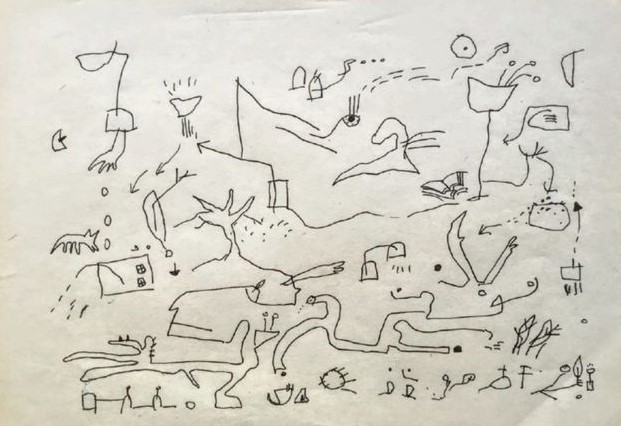

The one and only
Giving and receiving
By Beba, 51
I take great delight in my home by Danube river, the gentle waking to birdsong, the quiet that fills the day, the small manual tasks around the house (painting and minor repairs area form of working meditation for me), and the afternoon walks with my mother. After last year, and the realization that I might have lost her, I feel a deep need to spend as much meaningful time with her as I can. To walk together, to travel together, to watch her take pleasure in discovering new places, tasting new food and drink, or splashing about in the sea, laughing like a child.
As I grow older, not only because I have no child of my own to devote my care to, but because I have a genuine wish to bring joy to those I love, I find immense satisfaction in organising little things that add quality to my mother’s life. Or simply sitting with her to watch a film, play cards, or share a quiet moment on the terrace.
Of course, whenever I am back home I still see my dear friends, travel with some of them -but at the end of the day, when I am in Serbia, I wish to spend most of my time with my mother. For Serbia is the place where I give. I receive immeasurably, but above all, I give. And in the most beautiful way, that act of giving fulfills me.
Malaysia, on the other hand, is the place where I receive, where I learn and grow. I give here too, but only a little. As soon as I returned to Kuala Lumpur I feel a deep sense of calm. The rhythm shifts, the energy changes, and I surrender to it completely, without a flicker of doubt that this is the right place for me. It is.
These past days, in conversation with an acquaintance, I realized how blessed I am to live, within a single year, three distinct lives. One in Malaysia, devoted to myself. One in Serbia, devoted primarily to my mother, to Slankamen, and to friends. And one spent traveling across different meridians, sharing moments with strangers and friends alike, visiting them, or traveling alone. That third life enriches me with new experiences and insights which, in turn, nurture my personal growth and replenish the energy I need to give to those I love.
Do You Care?
By Beba, 51
My life in Asia is, by my own choosing, a solitary one, distant from everything among which I grew up and came of age. Solitary in the sense of not having a romantic or life partner, not in the sense of being without friends or people around me. Solitary, and yet incomparably richer and more varied than the life I led before coming to Asia, fulfilled in many different ways and closer to my innermost nature.
Here, I have learned to listen and to truly see others, to shed illusions, to draw nearer to the divine and, in doing so, to myself. Here, I have begun to grow into the person I wish to become. I have started to move away from hatred, from the need to judge, to be right, to prove something to someone. I am learning to free myself from inherited and accumulated personal and collective anger, to forgive, to forget, and to let what is dark within me depart from me.
Here, I am learning not to moralise, but instead to feel within my heart what is good or bad, right or wrong. These categories are far too rigid and limiting, yet for the moment I lack better ones.
My conversation with you has opened, first on a subconscious, and then on a quite conscious level, a theme that feels eternal: the question of that one and only love meant for us. Have we found it? Are we still waiting for it?
More than once over the past two and a half decades, across many latitudes and with friends of all kinds, I have revisited this theme, examining the loves that have marked our lives. And it seems to me that until now, until those few almost incidental sentences exchanged with you, I had never truly defined my own understanding of that one and only person for me. Now I know that in my life I have found the man who was my one and only, the one ‘made’ for me.
With V., as a young girl, I experienced everything for the first time. It was beautiful to explore together our emotions, our sexuality, our fantasies, our philosophies of life, our fears, expectations, hopes, and plans… The perfect man for first discoveries and first formations.
With S., I grew into a woman, aware of what I wanted or did not want, what I could accept or would refuse. With him, I deepened and expanded; I learned how to receive. With him and beside him, I will nurture, in friendship, both him and myself for the rest of my life.
The perfect man for self-discovery.
P. showed me how I loved in my mid-thirties, what I could sacrifice for love and what I could not. He taught me the pain of love, without which, I now understand, I would never have fully grasped its joy.
A. was unreservedly there when I was trying to become a mother. He gave me strength and support when my hormones so often triumphed over reason and emotion. The perfect man to teach me what it means to say, to others and to myself: ‘Enough.’
Those four men were, each in his own way, that one and only person at different stages of my life. A great blessing and a wealth which, at times, I was not fully aware of, but from where I stand now, I can only say I am profoundly grateful.
I grew up believing there was one man meant for me. I continue to grow, knowing that there is.
By Ada Cheng
Do birds dance?
Do frogs fly?
Do butterflies sing?
Do cows ski?
How do you know your potential
without crossing borders?
How do you know your limits
without turning inwards?
How do you know where the sky ends
without reaching
upward until
your last breath?
